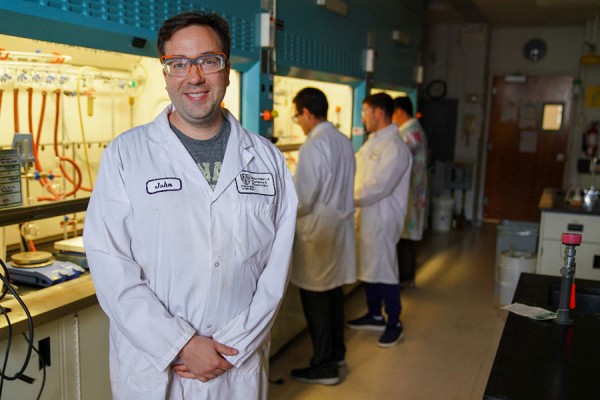 Chemistry professor John Trant has been awarded $150,000 to further his biomedical research.
Chemistry professor John Trant has been awarded $150,000 to further his biomedical research.
The province has identified UWindsor chemistry professor John Trant as a rising star in the world of biomedical research, awarding him a five-year grant to explore the crossroads of chemistry, materials science, and molecular biology.
Dr. Trant has been awarded $100,000 from the Ministry of Economic Development, Job Creation, and Trade’s Early Researcher Award program. The University of Windsor will contribute an additional $50,000 toward the award.
Trant’s award — one of 74 research projects being funded across the province — is the maximum available under the $10.3 million program.
“This funding ensures that we can keep and attract the world’s best talent to our multidisciplinary research team right here in Windsor-Essex,” Trant said.
His research involves the preparation of new types of carbohydrates, peptides, amino acids, and lipids for a variety of immunological, biomedical, and materials applications. Using computer modelling, 3-D bioprinting, organic chemistry, and molecular biology, Trant and his team are developing solutions to medical and material science challenges.
His innovations will pave the way for anti-cancer vaccines, and new materials to deliver chemotherapy drugs only to cancer cells.
“Our highly multidisciplinary program provides excellent training for the next generation of Ontario scientists, and has already attracted significant interest and some investment from both Ontario and non-Ontario businesses,” said Trant.
He has other research funding to design peptide drugs to treat rheumatoid arthritis. Current treatments for the painful disease suppress the entire immune system, leaving sufferers more susceptible to infection and cancer. Trant is instead trying to create custom-tailored drugs that block the molecular events that lead to rheumatoid arthritis without affecting the rest of the immune system.
The research holds the promise of finding a new way to treat all autoimmune diseases.
He has also partnered with UWindsor biologist Lisa Porter on research into the proteins that protect cells from mutating into tumours. The project is one of only four selected by a panel of international experts under the Cancer Therapeutics Innovation Pipeline of the Ontario Institute of Cancer Research.
“The University of Windsor is proud of Dr. Trant’s achievements,” said K.W. Michael Siu, vice-president, research and innovation. “The Early Researcher Award is a prestigious award that will help Dr. Trant build a team whose work holds the promise of improved health outcomes for people with cancer and autoimmune diseases.”
Minister Vic Fedeli announced the Early Researcher Awards together with funding for research infrastructure and genomics programs.
“We want to make sure the people who are learning how to cure diseases, who are inventing new technologies, and who are creating whole new industries and jobs have the support, tools, and facilities they need to do their work,” Fedeli said.
Last year, UWindsor professors Phillip Karpowicz and Christina Semeniuk were both recognized with five-year Early Researcher Awards.
Karpowicz, a biology professor, is using genetics to test how changes to the 24-hour circadian cycle affects intestinal health.
Semeniuk, a professor at UWindsor’s Great Lakes Institute for Environmental Research, is studying the ability of animals to compete for food, exploit new habitats and avoid predation in settings increasingly affected by environmental change.
─ Sarah Sacheli
